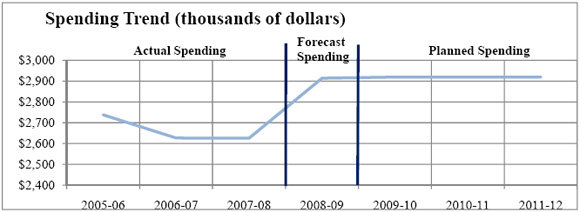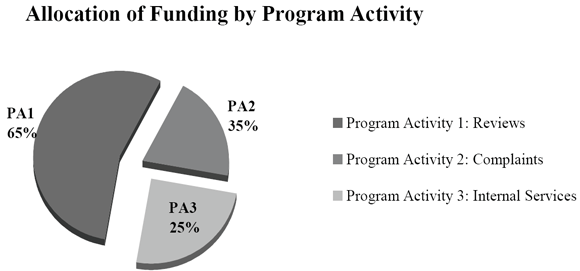Common menu bar links
Breadcrumb Trail
ARCHIVED - Security Intelligence Review Committee
 This page has been archived.
This page has been archived.
Archived Content
Information identified as archived on the Web is for reference, research or recordkeeping purposes. It has not been altered or updated after the date of archiving. Web pages that are archived on the Web are not subject to the Government of Canada Web Standards. As per the Communications Policy of the Government of Canada, you can request alternate formats on the "Contact Us" page.
Chair’s Message
I am pleased to submit SIRC’s Report on Plans and Priorities (RPP) for 2009-2010.
For over two decades, SIRC has been a cornerstone of the democratic accountability of CSIS by ensuring that it acts appropriately, effectively and lawfully in exercising its mandate to protect Canada’s national security. As Canada’s national security intelligence service, CSIS has unique powers and responsibilities. SIRC alone has both the legal mandate and expertise to carry out the ongoing, independent review of CSIS’s operations and activities.
SIRC’s mandate has remained unchanged since its creation, but proposed initiatives may affect Canada’s national security accountability regime in the future. In the fall of 2008, the Government announced that it intends to respond to the recommendations of Mr. Justice O’Connor by moving forward on comprehensive and robust review measures for the Canadian security intelligence community. In the fall 2008 Speech from the Throne, the Government indicated that it will be tabling a national security statement to outline how it intends to balance the new threats and challenges to national security faced by Canada with the need for oversight, accountability and the protection of civil liberties. SIRC will be closely monitoring these developments, as well as any others in the national security environment, to ensure that it is ready to adapt to change - and respond to any challenge.
I hope that this document provides readers with further insight into SIRC’s contribution to maintaining the delicate balance between Canadians’ rights and freedoms, and the protection of our collective security.
Honourable Gary Filmon, P.C., O.M.
Chair
SECTION I – AGENCY OVERVIEW
Summary Information
Raison d’être
The Canadian Security Intelligence Service (CSIS) performs its duties and functions in accordance with the law, policy and Ministerial direction.
Responsibilities
The Security Intelligence Review Committee (SIRC or the Committee) is a small, independent review body that reports to Parliament on the operations of the Canadian Security Intelligence Service (CSIS or the Service). It was established at the same time that CSIS was created in 1984, and derives its powers from the same legislation, the CSIS Act.
In order to fulfil its purpose, SIRC has two key Program Activities. The first is to conduct in-depth reviews of CSIS activities to ensure that they comply with the CSIS Act and the various policy instruments that flow from it, and with direction from the Minister. The second is to receive and inquire into complaints by any person about any action of the Service.
The Service continues at all times to be accountable for current operations through the existing apparatus of government, specifically the Minister of Public Safety, the Inspector General of CSIS, central agencies and the Auditor General, Information Commissioner and Privacy Commissioner of Canada.
Strategic Outcome
In order to pursue its mandate effectively, SIRC aims to achieve the following strategic outcome:
The Canadian Security Intelligence Service (CSIS) performs its duties and functions in accordance with the law, policy and Ministerial direction.
Program Activity Architecture
The chart below illustrates SIRC’s framework of program activities, which roll-up and contribute to progress toward the organization’s Strategic Outcome.

Planning Summary
Financial Resources (thousands of dollars)
| Financial Resources | 2009-10 | 2010-11 | 2011-12 |
|---|---|---|---|
| Planned Spending | $2,919 | $2,919 | $2,919 |
The financial resources table above provides a summary of the total planned spending and cost of services received without charge for SIRC for the next three fiscal years.
Human Resources
| Human Resources | 2009-10 | 2010-11 | 2011-12 |
|---|---|---|---|
| Full-Time Equivalents (FTEs) | 21 | 21 | 21 |
The human resource table above provides a summary of the total planned human resources for SIRC for the next three fiscal years.
| Strategic Outcome 1: The Canadian Security Intelligence Service (CSIS) performs its duties and functions in accordance with the law, policy and Ministerial direction. | ||||||
| Performance Indicators | Targets | |||||
|---|---|---|---|---|---|---|
| Number of reviews/complaint investigations that reported CSIS activities were in compliance with the CSIS Act, Ministerial Direction and operational policy | No major incidents of non-compliance by CSIS | |||||
| Program Activity | Expected Results | Forecast Spending | Planning Spending ($ thousands of dollars) |
Alignment to Government outcomes | ||
| 2008- 09 |
2009- 10 |
2010- 11 |
2011- 12 |
|||
| Reviews | Improvements to CSIS performance | $1,582 | $1,577 | $1,577 | $1,577 | SIRC provides assurance that the Service is acting within law, policy and Ministerial direction when contributing to such government outcomes as the safety of Canada, the security of the Canadian marketplace and support for a strong and mutually beneficial North American partnership. |
| Complaints | Parties before SIRC receive a fair and timely resolution of their complaint | $564 | $569 | $569 | $569 | |
| Internal Services | Corporate management to support the needs of the organization and fulfill corporate obligations | $768 | $773 | $773 | $773 | |
| Total for Strategic Outcome | $2,914 | $2,919 | $2,919 | $2,919 | ||
Contributions of Priorities to Strategic Outcome
| Operational Priorities | Type | Links to Strategic outcomes | Description |
|---|---|---|---|
| Continuous improvement in the review and complaints programs | Ongoing | SO 1 |
|
| Management Priorities | Type | Links to Strategic outcomes | Description |
| Improved corporate management | Ongoing | SO 1 |
|
Risk Analysis
In recent years, the security intelligence community has undergone several legal, policy and program reforms in response to the evolving threat environment. SIRC continues to monitor discussion and debate about potential and ongoing Government initiatives that may impact upon the nature and scope of SIRC’s reviews and complaints investigations.
SIRC has paid close attention to the work of the Commission of Inquiry into the Action of Canadian Officials in relation to Maher Arar. In fall 2008, the Government announced that it intended to respond to Mr. Justice O’Connor’s recommendations by moving forward on comprehensive and robust security intelligence review measures. In December 2006, Mr. Justice O’Connor proposed that independent review and complaints investigations be extended to encompass the national security activities of Citizenship and Immigration, Transport, the Financial Transactions and Reports Analysis Centre and Foreign Affairs and International Trade, and that SIRC was the logical body to assume this role. SIRC remains ready to assume an expanded role, subject to a full and complete assessment of possible workload and resource implications.
SIRC will also carefully study the analysis and recommendations of Mr. Justice John Major, whom the Government appointed in May 2006 to lead an independent judicial inquiry into certain aspects of the 1985 Air India bombing.
Proposed legislation to establish a National Security Committee of Parliamentarians died on the order paper when the previous Government fell in 2006. SIRC remains concerned about respective mandates and possible overlap and duplication, should the Government pursue this initiative. SIRC’s Members would also have to address legal issues in responding to Parliamentary requests for classified information, which could conflict with their Oaths of Secrecy and certain provisions of the CSIS Act.
SIRC will also continue to adjust its focus to account for CSIS’s involvement in new operating environments. In 2006, CSIS undertook a significant organizational realignment to streamline its operations and to reflect the changed operational environment. These changes have increased operational capability, as well as consolidated and enhanced analysis and production functions. SIRC’s review function has been adapting to these changes, in order to ensure regular examination of all CSIS operations and activities. There remains ongoing debate on the possible expansion of CSIS’s mandate to include foreign intelligence gathering abroad. A formal expansion of CSIS’s role would have major implications for SIRC, as it would introduce entirely new activities for the Committee to monitor.
Given its very small staff complement, SIRC struggles with central agency reporting requirements. Although SIRC supports the principles of modern management accountability, it lacks dedicated functional specialists who would be solely responsible for financial and human resource management. As a result, SIRC must increasingly rely on a combination of external contractors and internal staff, which diverts resources from its core functions.
Expenditure Profile
For the 2009-2010 fiscal year, SIRC plans to spend $2.9 million to meet the expected results of its program activities and contribute to its strategic outcome. The figure below illustrates SIRC’s spending trend from 2005-06 to 2011-2012.

For the 2005-06 to 2007-08 periods, the total spending includes all Parliamentary appropriation and revenue sources, namely Main Estimates and Treasury Board Vote 15. For the 2009-10 to 2011-12 periods, the total spending corresponds to the planned spending and revenues. Supplementary funding and carry forward adjustments are unknown at this point and, therefore, are not reflected in the expenditure profile.

Voted and Statutory Items
This table illustrates the way in which Parliament approved PCA resources, as well as how SIRC spent its funds.
Voted and Statutory Items displayed in the Main Estimates
| Vote # of Statutory item (S) | Truncated Vote or Statutory Item | 2008-09 Main Estimates ($ thousands of dollars) |
2009-10 Main Estimates ($ thousands of dollars) |
|---|---|---|---|
| 30 | Program Expenditure | $2,637 | $2,649 |
| (s) | Contributions to employee benefit plans | $284 | $277 |
| Total | $2,921 | $2,926 |
